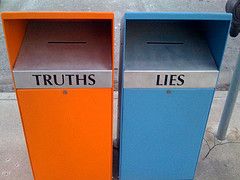Deception
Parental Lying
Is lying a parent survival strategy or a booby trap for our Well-Being?
Posted August 3, 2012

“Tomorrow, maybe”. The father was standing at the ice cream vending machine with his young daughter as she was pleading for a sweet treat at the end of the camp day. Battling 100 degree weather with a sibling in his hands and an agenda that was driving him out the door, the father looked down at his daughter and said “Tommorow, maybe”. Well now tomorrow is today and what are the chances that daddy walked into camp wielding two crisp dollars bills that will slide nicely into the machine and spit out a chocolate fudge bar? I’m not sure, but I started thinking, how often do you tell a lie or stretch the truth to influence your child’s behavior? Parents stretch the truth, feign ignorance or tell a little white lie in order to shape their child’s behavior and emotions, but what sort of impact does it have on parent Well-Being?
I was once working with a client who told me that she had a penchant for scaring her daughter into doing the right thing. She would give her a direction like “put your plate in the sink” and if she didn’t listen, she would tell her daughter that Grandma was going to come down from heaven and yell at her. Pretty extreme, I know, but apparently Grandma had a scary face, so the daughter willingly complied. For now. But what happens when Grandma’s face loses its evil glare and daughter figures out the truth? What motivation will the child have to take the plate to the sink then?
Apart from Gail Heyman, professor of psychology at UC San Diego and Kang Lee, professor at the University of Toronto, little research has been done on parental lying and deception. Heyman and Lee reported research from two related studies on parenting lying in the United States. They found that “parenting by lying” occurs for two reasons: as a way to influence behavior and as a strategy for making a child happy. In the study, parents reported lying to their children about bad things happening to them if they didn’t go to bed. One parent told her child that if she wrapped up all of her pacifiers as gifts, the pacifier fairy would come and take them to children in need. And if you think that Susie forgot about the pacifier fairy when she went to college, think again. In a related study, college students were interviewed about lies their parents told them and found that parents who most strongly promoted the importance of honesty with their children engaged in parenting by lying. Double standard.
Parental lying damages the parent-child relationship and decreases intrinsic motivation. If children learn to cooperate when told a lie, they will not learn the appropriate behavior to demonstrate in the first place. Instead of lying, explain the purpose or higher meaning behind the desired behavior. “In this house we take our plates to the sink because it keeps our house clean and tidy.” By highlighting the purpose, children will learn what you value as a parent, and they will internalize and value the same goal.
Lying also has an impact on Parent Well-Being. Lying is cognitively demanding and there is only so much information that your brain can handle at any one time. Lying is intentional, deliberate and exhausting because the liar must always remember the fictional story she is creating and get the facts straight. The child (as we know she does) asks questions about the lie, “what does the pacifier queen look like?” “where does she live?”, “is she nice?”, “will she leave me a present?”, the liar must continue to add fictional details to the story. The liar must also appear credible. You don’t want Susie to see that you are telling a lie, so you must watch your facial expressions and body language. Would you rather expend mental energy lying or telling the truth, which is automatic and effortless?
Your mental reserves are a precious psychological resource. Protect them and keep them fresh. Don’t let the heat of a power struggle melt away the sweet wholesome treat that will be waiting for you…Tomorrow. Maybe.


